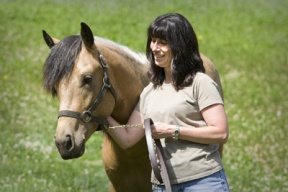Island-raised ponies find a way into children’s literature.
As a child in Maryland, Lois Szymanski escaped into literature. And like so many generations of young girls, she was drawn to stories of horses.
“My childhood was not great,” Szymanski said, “but ‘Misty’ was a book I was addicted to. I could always pretend I was somewhere else.”
When Marguerite Henry’s Newberry Honor-winning “Misty of the Chincoteague” was published in 1947, it branded itself into the collective consciousness of horse-loving girls and quickly took its place among American children’s literature classics.
It also shined spotlight on a breed that until then had lived in relative wild obscurity on Assateague Island, off the coast of Maryland and Virginia.
Yet if fiction made Chincoteague ponies famous, it also romanticized them. Szymanski turned her childhood love of horse literature into a career as a juvenile fiction writer, notably her “Charming Ponies” series.
But as she developed an increased curiosity about the breed and began to dig around, she found nothing on the kids’ book market about what it’s really like to live and work with these hardy, gentle beings.
“As popular as ‘Misty’ is,” Szymanski said, “you’d think that someone would have written a book by now about what happens when they leave this island.”
So she set about a new foray into non-fiction, beginning her research with a call for information on a Chincoteague message board.
Bainbridge islander Adrienne Wolfe of Rolling Bay Farm was one of the first to respond. With just two acres, three horses and a full-time day job, Wolfe has managed both to create a viable Chincoteague breeding business and to become an ambassador for the breed on the West coast.
When Wolfe saw Szymanski’s post, she said she immediately reached out to help Szymanski find contacts, breeders and trainers to assist her research. Wolfe also shared her first-hand experiences in breeding and cohabitating with her own family’s Chincoteague ponies.
“She’s very active in the breed,” Szymanski said. “She’s such a good promotional person. I don’t think there are many others who get the word out (like she does) about how good they are.”
Wolfe and Szymanski both point out that Chincoteague ponies are even now overlooked in the horse world despite their fictional popularity, not to mention their versatility, strong capacity for companionship and growing success in large-scale national pony competitions.
Each in her own way has made it a mission to educate the general public about these animals.
Where “Misty” feeds young readers’ imaginations, “Out of the Sea” presents an accessible, practical introduction to the ponies – from how they first came to be on Assateague Island, to profiles of riders and breeders like Wolfe to a description of the annual Pony Penning, during which a group of ponies are taken from Assateague to Chincoteague and then put up for auction.
Wolfe said what impressed her most about the final version of “Out of the Sea” were the facts Szymanski dug up such the steps taken by the Chincoteague Volunteer Fire Company, which owns the ponies, to enhance the line through judicious breeding.
And despite the fact that Wolfe says she isn’t sentimental of overly “mushy,” portions of the book moved her.
“When I read the introduction, I got a little teary-eyed,” she said.
The book’s forward describes how Szymanski’s daughter came to acquire their first Chincoteague pony in 1995 through a gift from Carollynn Suplee, a Chincoteague lover who every year purchased a pony at the Pony Penning and then donated it back to the island, or in Szymanski’s case, to a deserving child.
Suplee passed away in 2003, and in her honor Szymanski and her husband created the non-profit Feather Fund, which generates scholarship money to help children purchase and care for Chincoteague ponies.
She hopes to teach children valuable life lessons about responsibility and caring as well as continue educating people about the breed.
Education is one of Wolfe’s primary missions as well. A lifelong horse enthusiast, Wolfe stumbled on the Chincoteague breed some years ago and was hooked.
Now, in addition to having formed the Chincoteague Pony Breeders Association, she writes a regular column for Ride! magazine and frequently welcomes school groups, scout troops and individuals who want an up-close, hands-on glimpse of these personable animals.
“I really like having kids out, just to enjoy the horses,” she said.
“Out of the Sea” won’t hit the shelves until August 1, but Szymanski will take advance copies to next week’s Pony Penning to sign. Wolfe, meanwhile, is also headed out of town; she and her stallion, Santana, will attend an equestrian festival in Mt. Vernon. Wolfe will host a booth for the pony breeders association and hope that Santana cooperates by standing still as she discusses his still-misunderstood breed.
“I’m very giving of my information,” Wolfe said. “To me, my job is to educate and share as much as I can.”
************
My little pony
For more information about Lois Szymanski’s “Out of the Sea: Today’s Chincoteague Pony,” visit www.redlinerocks.net/Lois/. To find out more about the breed and Adrienne Wolfe’s horses, see www.rollingbayfarm.com.



